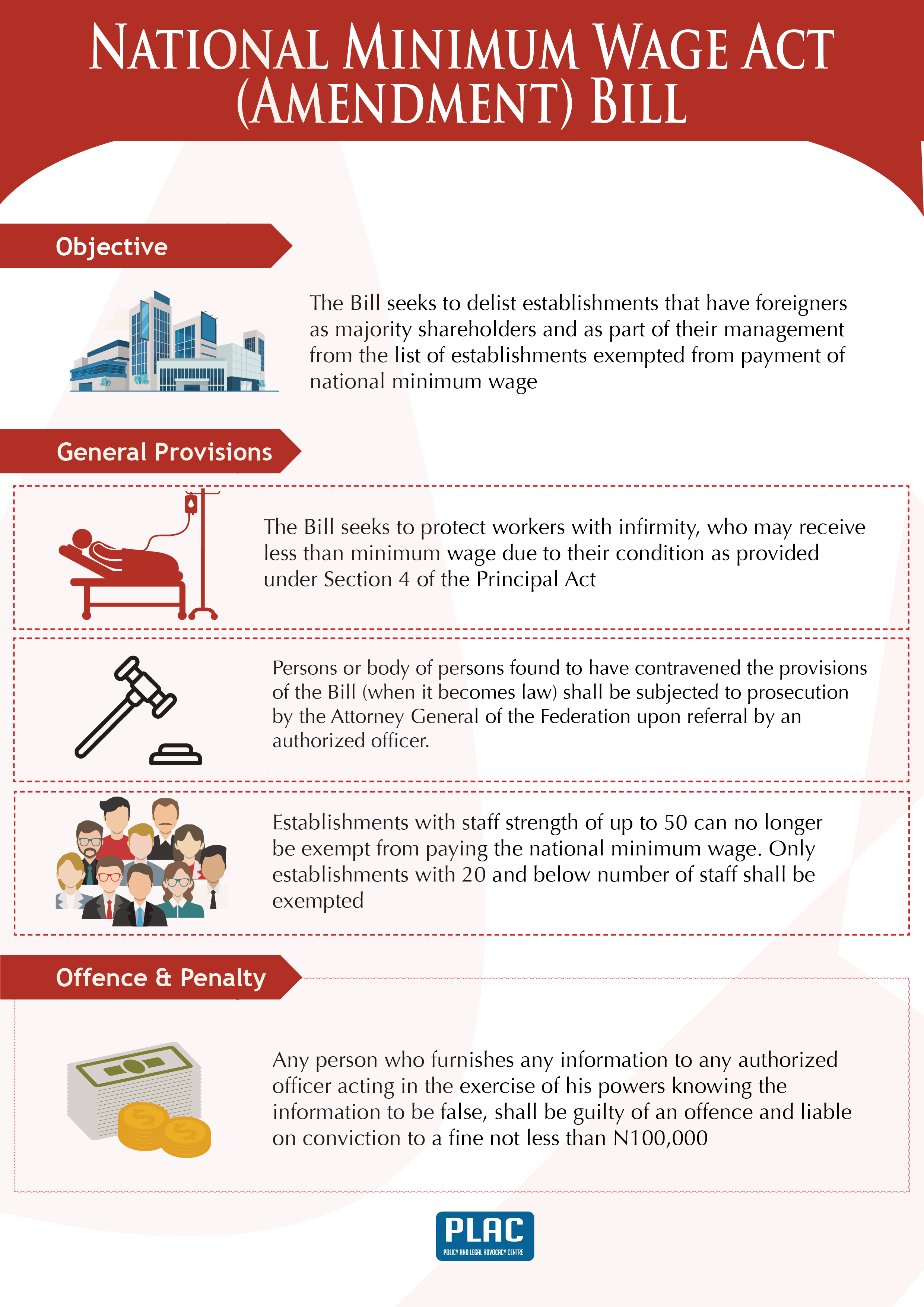HB 281: National Minimum Wage Act (Amendment) Bill, 2015
Download Bill Bill Analysis Download Bill Analysis Infograph
Sponsor:
Hon. Peter Ohiozojeh Akpatason
State:
EDOParty:
ALL PROGRESSIVES CONGRESSBill Status: Passed!
- First Reading: 10/12/2015
- Second Reading: 04/05/2016
- Committee Referred To: Committee of the Whole
- Consolidated with:
- Date Reported out of Committee:
- Third Reading:02/06/2016
- Reconsidered and Passed:
Bill Analysis:
SHORT TITLE
National Minimum Wage (Amendment) Bill, 2015
OBJECTIVE
To exclude establishments that have foreign participation from the list of establishments exempted from the payment of national minimum wage
AMENDMENTS PROPOSED BY THE BILL
National Minimum Wage Act (“Principal Act”) |
National Minimum Wage (Amendment) Bill, 2015 |
|
Section 2 (1) – “Any agreement for the payment of wages less than the national minimum wage as prescribed in subsection (1) of this section, shall be void and of no effect whatsoever.” Except: -
(c) an establishment at which workers are paid on commission or on piece-rate basis (e) any person employed in a vessel or aircraft to which the laws regulating merchant shipping or civil aviation apply
|
Clause 2 of the Bill seeks to amend Section 2 of the Act by deleting the underlined word – “…fifty” and replace it with “twenty” under Section 2(1)(a) of the Principal Act.
Clause 2(1)(c) seeks to add the proviso – “Provided that this exemption does not apply to an establishment that has participation” to Section 2(1)(c) of the Principal Act
Clause 2(1)(b) proposes the deletion of Section 2(1)(e) of the Principal Act |
|
Section 4 – “If the Minister is satisfied that any worker employed or desiring to be employed in any occupation to which the national minimum wage is applicable is affected by any infirmity or physical injury which renders him incapable of earning the national minimum wage, the Minister may, if he thinks fit, grant to the employer (subject to such conditions, if any, as he may impose) a permit exempting the employer from the provisions of this Act relating to the payment of wages less than the national minimum wage in respect of that worker; and while the permit is in force and any conditions imposed thereon are complied with, the employer shall not be guilty of an offence if he pays to the worker a lesser wage than the national minimum wage.” |
Clause 3 of the Bill proposes to delete Section 4 of the Principal Act
|
|
Section 6(3)(c) of the Act provides – “subject generally to the powers of the Attorney-General of the Federation, institute proceedings for any offence under this Act and, if he so wishes, appear and have all the necessary powers for the conduct of the proceedings |
Clause 4 proposes the amendment of Section 6(3)(c) of the Principal Act by replacing it with “refer any person or body of persons found to have contravened the provisions of this Act to the Attorney-General of the Federation for prosecution” |
|
Section 7 (2) – (4) of the Act provides – “Where an employer is charged with an offence under this Act, he shall be entitled upon complaint duly made by him and on giving to the prosecution not less than three days' notice in writing of his intention, to have any other person to whose act or default he alleges that the offence in question was due, brought before the court at the time appointed, for the hearing of the charge, and, if after the commission of the offence has been proved, the employer proves that the offence was due to the act or the default of that other person, that other person may be charged with the offence, or, if the employer further proves that he has used all due diligence to secure that this Act is complied with, he shall be acquitted of the offence. (3) Where a defendant seeks to avail himself of the provisions of subsection (2) of this section- (a) the prosecution as well as the person whom the defendant charges with the offence shall have the right to cross-examine him if he gives evidence and any witness called by him in support of his plea, and to call rebutting evidence; and (b) the court may make such order as it thinks fit for the payment of the costs by any party to the proceedings, other than the prosecution, to any other party thereto.
(4) Where it appears to an authorized officer that an offence has been committed in respect of which proceedings might be taken under this Act against an employer, and the officer is reasonably satisfied that the offence of which complaint is made was due to an act or default of some other person and that the employer could establish a defense under subsection (2) of this section, the officer may cause proceedings to be taken against that other person, and in any such proceedings the defendant may be charged with the offence and on proof that the offence was due to his act or default, be convicted for the offence for which the employer might have been charged. |
Clause 5 seeks to amend Section 7 by deleting subsections (2) – (4)
|
|
Section 8 (f) of the Act provides – “Furnishes any information to any authorized officer acting in the exercise of his powers under this Act, knowing the information to be false, shall be guilty of an offence and liable on conviction to a fine not exceeding N500 or to imprisonment for a term not exceeding three months or to both such fine and imprisonment.” |
Clause 6 proposes to amend Section 8 of the Principal Act by substituting the underlined phrase “not exceeding N500” with “not less than N100,000” |
|
|
Interpretation Section of the Act is amended by adding the definition of “foreign participation” as: - “establishment with foreigners as majority shareholders and in their management” |
CONCLUDING NOTES
The Bill seeks to delist establishments that have foreigners as majority shareholders and as part of their management from the list of establishments exempted from payment of national minimum wage.
The amendments seek to protect workers with infirmity, who may receive less than the minimum wage under Section 4 of the Principal Act; and workers who may be under a contract that could subject them to earning below the minimum wage because their employers are exempted under Section 2 of the Principal Act (See the table above). Persons or body of persons found to have contravened provisions of the Bill (when it becomes law) shall be subjected to prosecution by the Attorney-General of the Federation upon referral by an authorized officer.
If the Bill becomes law, establishments with staff strength of up to 50 can no longer be exempt from paying the national minimum wage. Only establishments with 20 and below number of staff shall be exempted. Establishments with foreign participation as provided under this Bill shall no longer be exempted as well.
Infographic:
